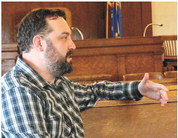Religion complaint deadlocks Gilman board
Board members split over family’s complaint about exposure to world religions
Tasked with determining whether or not to follow the recommendation of the Complaint Procedure Committee to leave the CKLA curriculum as is, the Gilman School Board was deadlocke...





